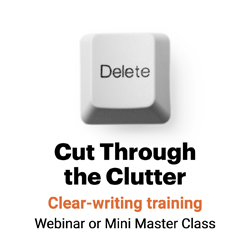People perform better when they’re not drowning in data
The more information you have, the better decisions you can make, right?

Wrong.
It turns out that doctors make better diagnoses when they have less information. Shoppers buy more when they have fewer options. Accountants are more effective when they have less information. So are investors, seniors, psychologists and Marines.
Let’s take a look at the research …
Doctors make better decisions with less information.
A cardiologist named Lee Goldman created an equation to take the guesswork out of treating chest pain, Malcolm Gladwell reports in Blink. Doctors, he found, would make the best diagnoses if they combined ECG results with the answers to just three questions:
- Is the patient’s pain unstable angina?
- Is there fluid in the patient’s lungs?
- Is the patient’s systolic blood pressure below 100?
When emergency room doctors at Cook County Hospital (the one that inspired the TV show “ER”) used Goldman’s equation, they diagnosed heart attacks correctly 95% of the time. When they gathered lots of additional information about the patient, they diagnosed heart attacks correctly just 75% to 89% of the time.
So consider user intent. Are these folks supposed to make good decisions based on your content? If so, a high-quality short-form piece might make more sense.
Accountants are more successful with less information.
Two accounting professors at the University of South Carolina hypothesized that too much information would overload accountants studying companies’ fiscal health.
That overload, Eugene G. Chewning Jr., Ph.D, CPA, and Adrian M. Harrell, Ph.D, believed, would hurt the accountants’ decision-making abilities. So they decided to test that theory.
The professors gave each of 84 accountants and accounting students four to eight financial ratios (such as P/E, or price/earnings ratios).
Then they asked these participants to predict whether a company would suffer some kind of financial distress — such as filing for bankruptcy, defaulting on a loan payment or missing a stock dividend payment — within the next three years.
Accountants were more successful at predicting the right outcome when they received six ratios instead of four.
But when they received eight ratios, they were less successful than when they received only six ratios.
Why?
Because the more information they received, the less they used. When they were given six ratios, the accountants actually used five; but with eight, they incorporated only four ratios into their decision-making process.
“The decision maker is considered to have experienced information overload at the point where the amount of information actually integrated into the decisions begins to decline,” Chewning and Harrell write. They may not even be aware that they’re doing it.
Shoppers, investors, others perform better with less.
Indeed:
- Shoppers buy more when they have fewer options. In one study, researcher Sheena Iyengar set up a tasting booth of gourmet jams. When offered six flavors, 30% of folks who stopped by the booth bought some jam. When faced with 24 options, only 3% of shoppers made a purchase.
- The more information they get, the less likely employees are to opt into their 401(k) plans. In a study for Vanguard, Iyengar found that for every 10 funds a company added to its options, the number of employees enrolling dropped by 2%. With two options, 75% of employees participated; when there were 59 funds, only 60% enrolled. “If it’s a lot of work to choose among the funds, many people will postpone the decision and never sign up,” she says.
- Seniors perform poorly when overwhelmed with Medicare plans. When seniors had to choose a Medicare prescription drug benefit, they were overwhelmed by dozens of similar options. In the end, some 10% of seniors didn’t enroll by the deadline, even though it meant they’d have to pay extra to enroll late.
Too much information also made it harder for psychologists to diagnose patients and for Marines to win battles, Gladwell reports.
Short-form content also makes messages easier to read, more efficient to read, and easier to understand and remember. And it helps readers choose more wisely.
Is that extra word count really worth it?
‘Selecting is stealing resources from understanding.’
Why do people use fewer pieces of information when they have more?
Before they’re overloaded with information, people spend their time understanding the information they receive. When they have more information than they have time to process, they spend their time instead selecting which information to process.
“‘Selecting’ is stealing resources from ‘understanding,’ resulting in poorer decisions,” writes TJ Larkin, principal of Larkin Communication Consulting.
Are you giving your readers so much information that they’re focused on selecting instead of understanding? If so, you may be hurting their ability to make good decisions.
Don’t drown them in data.
It would seem that the more information we give people, the better off they’d be. Unfortunately, the reverse is true. The more information people get, it seems, the worse their decision-making skills become.
Is that really the purpose of your content marketing strategy?
“Having an abundance of information does not always translate into” informed choices, write researchers Judith H. Hibbard and Ellen Peters. “The amount of information may exceed human information processing skills.”
And when that happens, people shut down. They may simplify the decision by relying on others’ advice, by ignoring some of the information or by basing their decisions on the wrong things. Or they may not make a decision at all (Hibbard, Slovic and Jewett, 1997).
Does your long form content require too much of your readers? What types of content might be better if they’re shorter?
In Blink, Gladwell writes:
“We take it, as a given, that the more information decision makers have, the better off they are. …
“But what does the Goldman algorithm say? Quite the opposite: that all that extra information isn’t actually an advantage at all … In fact … that extra information is more than useless. It’s harmful. It confuses the issues.”
As Tom Rosenstiel, former media critic for the Los Angeles Times, says:
“You’re not more informed. You’re just numbed.”
Are you informing your readers? Or just numbing them?
____
Sources: Eugene G. Chewning Jr. and Adrian M. Harrell, “The Effect of information Load on Decision Makers’ Cue Utilization Levels and Decision Quality in a Financial Distress Decision Task,” Accounting, Organizations and Society, vol. 15, no. 6, 1990, p. 527-542
Malcolm Gladwell, Blink, January 11, 2005
Judith H. Hibbard and Ellen Peter, “Supporting informed consumer health care decisions: data presentation approaches that facilitate the use of information in choice,” Nov. 6, 2001.
Ksenia Iastrebova, Managers’ Information Overload: The Impact of Coping Strategies on Decision-Making Performance, Ph.D. Thesis from Erasmus University, Rotterdam, March 2, 2006
TJ Larkin and Sandar Larkin, “Information Overload Hurts Performance,” Larkin Page, No. 57, March 2007
Penelope Wang, “How to make better investment choices,” Money, June 2, 2010

Leave a Reply